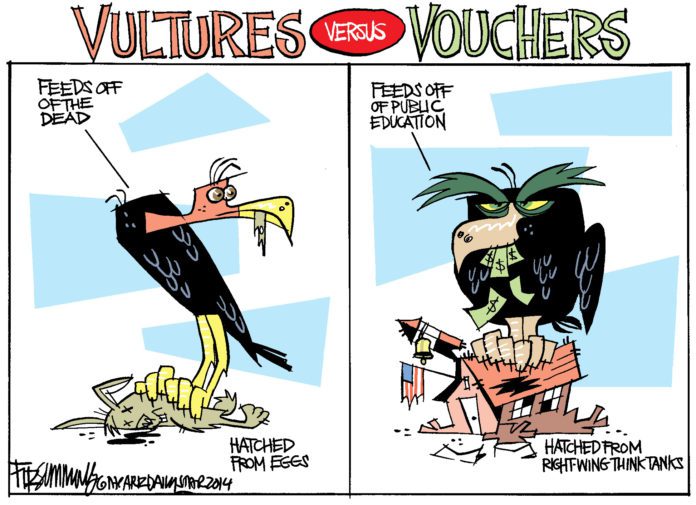BY ARNOLD HAMILTON
 It is hardly hyperbolic to argue this year’s election could be the most consequential in Oklahoma history.
It is hardly hyperbolic to argue this year’s election could be the most consequential in Oklahoma history.
Not because a bloviating demagogue and wannabe strongman is the Republican nominee for president, though that is truly scary.
Or because the fate of Oklahoma’s magnificent – but shamefully underfunded – public schools depends on voters’ willingness to pay higher sales taxes [SQ 779].
Or even because Oklahomans finally could overhaul a failed and costly lock-‘em-up and throw-away-the-key criminal justice system that begat the nation’s second-highest incarceration rate [SQs 780/781].
Any of those three realities are sufficient to include 2016 in a most-important-election-ever argument.
But there’s another issue lurking on the Nov. 8 ballot that could have an even more profound impact long-term on Oklahoma as we know it: the proposed demolition of the state Constitution’s strict church-state wall, SQ 790.
While public school supporters focus primarily on SQ 779 – the proposed 1% sales tax that could generate $600 million annually in new education revenue – they may be aware that SQ 790 could end up siphoning millions more from taxpayer-funded classrooms.
How so? By eliminating the church-state provision, Oklahomans would be legalizing the spending of tax dollars for sectarian purposes – including vouchers that would allow students to draw on taxpayer-funded, state education dollars to pay for attending church-sponsored schools.
“It’s worth noting this was not an initiative of the people,” says Jim Huff, a retired public school teacher who’s widely considered an expert on church-state separation. “This was done by a simple majority of the Legislature – it didn’t even have to go by the governor for review.”
SQ 790 could give taxpayers severe heartburn because steering public dollars to private – frequently religious – concerns are apt to be challenged in federal court under the U.S. Constitution’s establishment clause, meaning more precious tax dollars wasted on court battles that could have been avoided.
Good news: A new SoonerPoll suggests Oklahomans are beginning to understand that SQ 790 is a Trojan Horse. Forty-three percent of those surveyed somewhat or strongly oppose the measure, while only 41% support it. Sixteen percent remain undecided.
Proponents of SQ 790 are spreading two big lies in an attempt to mislead voters – first, that it’s primarily about returning the Ten Commandments monument to the state Capitol grounds and, second, that it’s about ending an anti-Catholic provision in the state Constitution.
The Ten Commandments were placed on the Capitol’s north plaza in late 2012, paid for by private donations from fundamentalist Christian state Rep. Mike Ritze. In 2015, the state Supreme Court ruled the Decalogue’s presence on public property violated Article 2, Section 5 of the state Constitution that reads:
“No public money or property shall ever be appropriated, applied, donated, or used, directly or indirectly, for the use, benefit, or support of any sect, church, denomination, or system of religion, or for the use, benefit, or support of any priest, preacher, minister, or other religious teacher or dignitary, or sectarian institution as such.”
“This is original language, this is history,” says Huff. “It’s so precise … it’s better than the [federal] First Amendment because it’s so specific.”
After the court ruling, the monument was moved about a mile south of the Capitol onto private property controlled by the right-wing Oklahoma Council of Public Affairs, the state’s leading proponents of vouchers. But the religious zealots who believe America was founded as a Christian nation and view the Ten Commandments as a public display of that revisionist history persuaded lawmakers to put SQ 790 on the ballot.
Clearly, eliminating Article 2, Section 5 would have much broader implications than allowing the Ten Commandments to return to the Capitol – including opening the door to other religious and atheist groups to erect the monuments of their choosing on public property.
Further, SQ 790 proponents argue that removing the state Constitution’s church-state separation clause actually rights a statehood era wrong – anti-Catholic bigotry known as the Blaine Amendment.
Actually, according to ACLU research, Blaine was a proposed 19th Century amendment – never ratified – to the U.S. Constitution aimed at “ensuring that public schools could not be operated by a church or otherwise under the control of any particular religion.” Oklahoma, of course, did not become a state until three decades later.
Moreover, what ultimately became the state Constitution’s church-state provision wasn’t a Blaine scion at all. It was crafted by a coalition of Christian ministers, Native Americans and other constitutional convention delegates irate that some government-sponsored religious schools were attempting to force Christianity on native students.
The legislative sleight-of-hand – promoted by the Daily Disappointment on its editorial pages – is not only designed to destroy the church-state wall, but also to juice turnout among religious fundamentalists who embrace the revisionist history that America was founded as a Christian nation.
Such single-issue voters are crucial to Republican efforts to minimize general election damage caused by their failed economic policies that disproportionately benefit the state’s wealthiest residents and cripple services vital to the state’s vast working class.
So what could happen if SQ 790 is approved? The Legislature’s GOP super-majority undoubtedly would redouble efforts to approve school vouchers – without fear of state courts standing in the way.
The state Department of Education – headed by a Republican superintendent, Joy Hofmeister – estimates vouchers could steer as much as $68.9 million from already underfunded public school classrooms.
Moreover, other studies suggest vouchers could divert as much as $2 billion over the next 14 years to private schools or homeschools, undermining accountability for tax dollars and student achievement.
So even if the education sales tax proposal [SQ 779] is approved – generating $600 million a year more for public education from Pre-K to higher ed to CareerTech – excising the constitutional prohibition on vouchers could create more funding headaches for public ed in the future.
Huff says approval of SQ 790 would create “a giant hole in the state Constitution about what we can do with state dollars, state property and state agencies.
“It could be challenged through the [federal] establishment clause, but that would take forever. We’d have to work our way up to the U.S. Supreme Court.”
It’s a risk informed Oklahoma voters should not take.
– Arnold Hamilton is editor of The Oklahoma Observer







